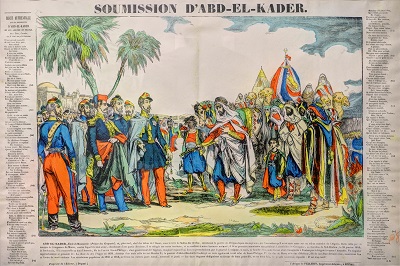This series has seven easy five minute installments. This first installment: Treaty Confirms Abd-el-Kader’s Power in Algeria.
Introduction
After the French, provoked by the conduct of Hasan, Dey of Algeria, had occupied Algiers, his capital, in 1830, a new government was set up in France, Louis Philippe ascending the throne in place of the expelled Charles X. At the time of this revolution in France the soldiers of Charles had already overrun a great part of Algeria; but they had not subdued the country, and their absolute dominion extended only a little beyond the capital itself. The French commander fortified his territory, but had to recruit his garrisons from among the natives. In 1833 Abd-el-Kader raised the standard of the Prophet, the Arabs rallied to his call, and for several years he carried on a stubborn war against the French, whom in 1835 he signally defeated.
In 1836 the Arab leader, now Sultan, again fought the invaders in several severe engagements on the Tafna River. In these affairs the advantage lay with the Arab. In June, 1836, General Bugeaud was sent to command the French forces, and he proved to be the strongest opponent that Abd-el-Kader had met. There was more fighting on the Tafna; it was indecisive, and in May, 1837, a treaty, known as the Treaty of the Tafna, was concluded, General Bugeaud having received instructions either to make peace with Abd-el-Kader or to subdue him.
This selection is from a Hero Patriots of the Nineteenth Century by Edgar Sanderson published in 1891. For works benefiting from the latest research see the “More information” section at the bottom of these pages.
The story of the Arab hero from this point in his career is told by Sanderson, the faithful commemorator of great nineteenth-century patriots, a high authority on modern Africa.
Time: 1837
Place: Algeria

CC BY-SA 3.0 image from Wikipedia.
The famous Treaty of the Tafna, concluded between Abd-el-Kader and Bugeaud, was a triumph for the Arab Sultan. With the consent of all the great sheiks, the leaders of cavalry contingents, the venerable Marabouts, and the most distinguished warriors of the Province of Oran, the Sultan, not acknowledging the sovereignty of France, but ceding to her a limited portion of the Provinces of Oran and Algiers, reserved the free exercise of their religion for all Arabs dwelling on French territory. He undertook to supply the French army with a large quantity of corn and oxen and to confine the commerce of the Regency to French ports. In return he received the administration of the larger part of the Provinces of Oran and Algiers, and the whole of Tittery; the important right of buying powder, sulphur, and weapons in France; and freedom of trade between the Arabs and the French. In ceding the Province of Tittery, Bugeaud had violated the strict orders of the French Government, alleging in excuse to the Minister of War that any other arrangement was “impossible.” The treaty, in fact, confined the French to a few towns on the seacoast, with small adjacent territories. All the fortresses and strongholds in the interior were left in the hands of Abd-el-Kader. He was the possessor of two-thirds of Algeria, and he appeared before the world as the friend and ally of France.
The treaty was held by the French Government to be a high stroke of policy, converting an enemy into an ally. The French people regarded it as a humiliating surrender of French territory to a rival power. It was the culminating point of Abd-el-Kader’s career.
During the year 1839 the Sultan was engaged in the work of a statesman, legislator, administrator, and reformer, displaying wonderful activity, enterprise, vigor, and intellectual power as the founder of an empire which, for the happiness of Algeria, was to be too short-lived. After the Tafna Treaty he had received a magnificent present of arms from Louis Philippe, King of the French, and, as a man who had subdued, either by arms or by persuasive eloquence, the hardy, high-spirited Kabyles he stood high in the estimation of his Moslem fellow-rulers in Morocco and Egypt, Tripoli and Tunis, and of the _ulemas_, or bodies of learned doctors in divinity and law, at Alexandria and Mecca, who watched with joy, and with ardent expectation of yet higher things, the career of one who seemed destined to revive the pristine glories of Islam. The great Sultan, in order to consolidate his power both against the French and over the Arabs, constructed a number of forts on the limits of the Tell at Sebdou, on the west; at Saida, south of Tlemsen; at Tekedemt, south of Mascara; at Boghar, south of Miliana; to the south of Medea, and to the southeast of Algiers. Tekedemt, an old Roman town about sixty miles southeast of Oran, was designed to be the capital, as a great centre of commerce between the Tell and the Sahara.
The first stone of the new city and fortress had been laid by the Sultan in May, 1836; and as the place grew, a population of settlers from Mascara, Mostaganem, and other towns poured in. Large stores of warlike munitions were formed, and a factory, worked by mechanics from Paris on liberal wages, turned out eight new muskets a day. A mint of silver and copper coins was established. The defenses carried twelve cannon and six mortars. A French observer, who was a prisoner at the time when the Sultan was personally directing the works at Tekedemt, describes his simple costume, like that of a laborer; his large tall hat, plaited with palm-leaves; his “incomparable grace” and “fascinating smile” as he saluted the man who was rather a guest than a captive.
| Master List | Next—> |
More information here and here and below.
We want to take this site to the next level but we need money to do that. Please contribute directly by signing up at https://www.patreon.com/history

Leave a Reply
You must be logged in to post a comment.